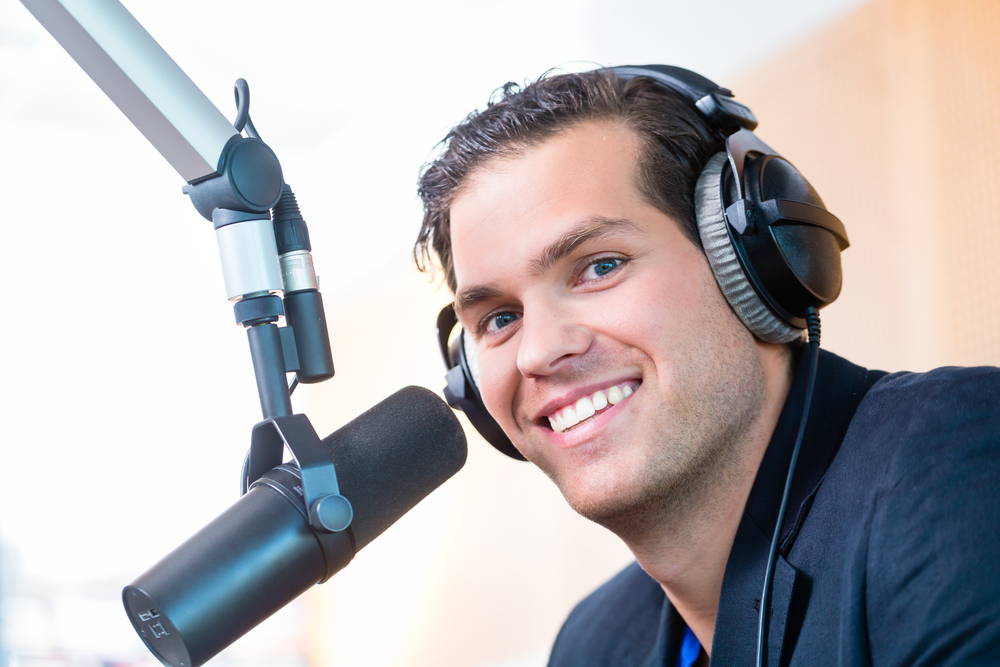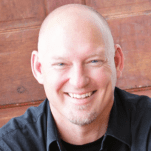This is a guest post by Shane Purnell, an IT professional, blogger and speaker who runs the popular Podcast Platform Giant. Shane knows a thing or two about starting a great podcast. I am thrilled he took the time to write a guest blog for us. Enjoy Shane’s secrets for starting a great podcast below. If you like the post, make sure to let him know on Twitter @heyshanepurnell. Enjoy! – John Lincoln
The Secret to Starting a Great Podcast
Podcasting is an incredible tool for personal branding and authority. When people discover that you’re a podcaster, they make certain assumptions about you and your authority. Some assume you must have deep subject matter expertise, some assume you must have a degree in audio engineering and some may even assume you must have a smooth radio voice that magnetically attracts listeners.
People make all sorts of assumptions about podcasts, too. They assume podcasting must be difficult so they never even try. They assume they’ll have to spend thousands of dollars on equipment and training without doing any research. They assume having a podcast will make them rich and famous.
Are you like those people? Do you assume podcasting is too hard or expensive? Do you assume it’s a shortcut to fame and fortune? Maybe you’re not like them. Maybe you wonder if it’s possible for you to start your own great podcast, even though you don’t have all the technical training, thousands of dollars or a smooth radio voice. Maybe you can do this but you’re just not sure.
If you’re full of doubt, stop worrying. The answer is –Yes! You absolutely can start your own great podcast. It’s not always easy, but thousands of others have done it and you can, too.
These tips will help you get started with a clear understanding of the road ahead.
Start with Basic Equipment and Software
I’ll admit it: When I started podcasting, the first thing I did was buy a microphone and a sound mixing board. Why? They’re essential for a great sounding podcast. OK, I confess. I really wanted them because I love playing with all of those fancy knobs and buttons, which is not a good reason to buy a mixing board and microphone.
Here’s the truth: You can create a great sounding podcast with a good USB microphone, like the Yeti from Blue ($110) or the ATR-2100 from Audio-Technica ($60). These two mics are perfect to start with because you can plug them directly into your computer’s USB port and you’re ready to go. You don’t need a $300 microphone and a $1500 sound mixer to podcast. A quality USB mic will do the trick.
Likewise, you don’t need to spend hundreds of dollars on audio editing software when you’re starting out. Tools like Avid’s Pro Tools are great, but who wants to drop $600 on complicated audio software?
Many podcasters who do their own editing, use low cost or free software like Garage Band or Audacity. You don’t have to invest in expensive audio software to get a great sound.
Don’t Spend Thousands of Dollars on Podcasting Boot Camps
If you want to learn how to podcast, there are myriad people willing to teach you, especially if you’re willing to pay them. They promise you podcasting riches and being featured in iTunes New & Noteworthy (more on that later). The only catch, you have to go to their exclusive boot camp to learn their insider secrets.
I’ve never been to any of these boot camps, but my guess is that you will likely learn how to podcast. You’ll also probably gain some insider knowledge from their experience, but here is what they don’t want you to know: You can learn most of what they’re teaching for free.
Do a Google search for “How to podcast” and you’ll get 255,000 results. Listen to podcasts like Dave Jackson’s School of Podcasting, Erik K. Johnson’s Podcast Talent Coach or Daniel J. Lewis’ Audacity to Podcast and you’ll be getting advice from successful industry veterans that will tell you what works, what doesn’t…. and they do it for free. (Discolure: these veterans do offer premium products and services for a fee, but their podcasts are free and very good.)
Don’t Just Hit Record, Think About Your Show
My first attempt at podcasting was a disaster. I was so excited to get going, I hit record and started blabbing into the mic. I’m sure it was a random stream of consciousness on whatever topic I thought was important, but I never considered the impact I wanted to have, the format of the show or even what I was trying to accomplish. I just wanted to podcast.
Don’t do what I did when you start your podcast. A little thought goes a long way when creating a show. Before you start recording the first episode of your podcast, ask yourself some questions like “What format will my show be? Will it be an interview show like Entrepreneur on Fire or a storytelling podcast like Serial? Will I have a co-host like Internet Business Mastery or will I have a solo podcast like Dan Carlin on Hardcore History? Am I going to have intro music and sound effects? Will I do my own sound editing or will I hire someone else?”
The more questions you ask before you start, the fewer obstacles you’ll have to contend with later.
Vet Your Podcast Idea
The number one question I get from would-be podcasters is “What should I podcast about?”
My response is always the same: “It doesn’t matter, as long as it’s something you’re passionate about, something you’re good at and something an audience is interested in. Ideally, your podcast sits at the intersection of those three criteria.”
I tell people they really need to take some time to think about it. They may not come up with an idea that satisfies that criteria. The goal is to get as close to as possible.
Once you’ve found a topic that satisfies those three requirements (or as close as you can get), write out 20-25 show ideas for your podcast. Why so many? People think they have great ideas for podcasts, but when they have to start writing down show ideas for their topic, it forces them to think about the show. When they only come up with seven ideas, they discover the idea wasn’t as good as they thought.
According to Todd Cochrane of the podcast-hosting company Blubrry, “Proper planning and execution of a new show can result in great success. Those shows that come up with a plan and then execute it, always do well…globally as high as 50% of shows do not make it past episode 7 without proper support and expectations.”
You MUST Be in iTunes
When it comes to visibility, iTunes is Podcasting. It is, by far, the largest podcast directory on the Internet. According to podcast hosting company libsyn.com, in 2015 iTunes and Apple’s podcast application accounted for 68% of all podcast downloads. The next closest was Stitcher with 2.5% of all downloads. Almost 70% of all podcast downloads come through Apple and iTunes. Essentially, if your podcast isn’t in iTunes, it doesn’t exist.
To Hell with New and Noteworthy! Enjoy Anonymity.
There’s a myth that’s perpetuated by marketers and those selling podcasting courses that you only have 8 weeks to get your podcast listed in iTunes New and Noteworthy section. The implication is that if you fail to get your podcast into New and Noteworthy, your show is doomed to fail. Conversely, if you’re featured in New and Noteworthy, it’s assumed your podcast will gain so much visibility, you’ll attract sponsors for your show and make tons of money.
Here’s the truth: New and Noteworthy will not make or break your podcast. Being featured there is nice, but according to Rob Walch, host of the podcasts Today in iOS, Podcast 411 and KC Startup 411 (a podcast that’s been in New and Noteworthy), you may get a temporary spike in downloads while your podcast is in New and Noteworthy, but it’s temporary. When you are out of New and Noteworthy, your download numbers tend to go back to their normal levels.
Instead of pressuring yourself to get into New and Noteworthy, focus on developing a great show. Unless you have a huge email list or are connected to some influencer, your first months of podcasting will likely happen in obscurity. That’s a good thing because you can use that time to perfect your podcast while no one is paying attention.
Quit worrying about New and Noteworthy – it’s not a metric you should focus on. Enjoy your anonymity while it lasts. Become an apprentice of podcasting, master your craft, create compelling content and let the numbers take care of themselves.
What if you can’t let the numbers take care of themselves? What if you need to know the numbers? If you have to have numbers, here are some to shoot for:
According to Libsyn, in February of 2016, half of all podcasts received less than 156 downloads per episode. That means you only need 157 downloads to be better than half the people podcasting. That’s encouraging. However, if you want to be in the elite category of podcasters, the top 8%, you’ll need 5,000+ downloads per episode. If you’re okay with average, 1800 downloads per month will get you there.
You Are NOT “On Fire”
In 2012, John Lee Dumas turned the podcasting world on its head when he created his daily podcast, Entrepreneur on Fire. Up until then, the conventional wisdom was that podcasts should be released weekly. Everyone thought he was crazy for doing a daily podcast. He must have been crazy like a fox because according to his website, he grossed $116,000 in March of 2016 from Entrepreneur on Fire.
Now, John Lee Dumas and Entrepreneur on Fire have all sorts of copycats that think they need to do what he did to succeed. Want proof? Search iTunes podcasts for “on Fire” and see how many people have created podcasts that emulate his podcast and his brand.
You are not John Lee Dumas, so don’t copy what he did. Come up with your own angle and make your podcast uniquely you.
Listen to Other Podcasts
I feel that my podcast, The Platform Giant Show, is uniquely me, but that doesn’t mean I haven’t borrowed inspiration from other podcasts. I like how Ryan Rhoten summarizes his interviews at the end of his Brand New You podcast, I like the way that Jeff Brown asks questions on his Read to Lead podcast and I like the way that Jeff Goins interjects musical transitions into his The Portfolio Life podcast. I take what I like about each of their shows and put my own spin on it. All of them have inspired me to set a higher standard for my own show. I encourage you to incorporate what you like from your favorite podcasts into your own. Don’t steal – put your own twist on it.
The Secret to a Great Podcast
Want to know the secret to great podcasting? It’s great content. If you consistently show up with great information, delivered in an entertaining way, your podcast will grow.
You may be tempted to buy advertising or use other methods to get people to your podcast page. I encourage that. Do what you can to get people to your show. Even if you drive thousands of visitors to your podcast with marketing and promotion, people still have to listen to your show. If it’s not good, they won’t come back. For your podcast to succeed, you need to build an audience. The secret to building an audience is focusing on producing a great show that people want to hear.
Conclusion
Creating a great podcast is like creating great writing. It takes a little talent, some time and a lot of effort. It’s a skill that improves with use. Can you create a great podcast even if you don’t have all of the necessary skills right now? Absolutely! But you have to stay with it long enough to get better.
What things do successful podcasters do that others don’t? First, successful podcasters take action. You can’t produce 50 shows if you don’t start the first one. Second, they keep showing up. They stay with it week in and week out. They consistently publish new podcasts. With time and consistency, they improve, they find their audience and their podcasts grow.
Podcasting, like writing, is part art and part science. You have to know a little and you have to experiment a lot. You don’t have to have total confidence to get started. You don’t even have to do it right to get started, but you do have to start to get started.
Want to start a podcast? Have you already started a podcast? Tell me your podcasting story below.
Shane Purnell is a Technical Product Manager, and host of The Platform Giant Show. Check out his latest podcast here.


